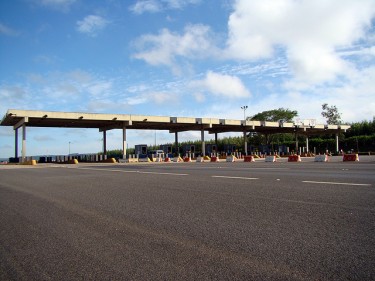All links lead to Portuguese language pages except when otherwise noted.
After the approval of the Urban Mobility Law at the beginning of 2012, a discussion surrounding toll roads in all national territory came back into play. According to the law, cities will be able to charge an “urban toll” with the intention of diminishing automobile traffic and improve circulation around the cities. However, the implementation of yet another toll makes internal mobility impracticable for a portion of the population, given that several important federal and state highways have already been privatized.
According to data from the Brazilian Association of Highways Concessionaires (Associação Brasileira de Concessionárias de Rodovias – ABCR), of which 55 companies are members,
Essas concessionárias operam 15.365 quilômetros de rodovias, o que corresponde a aproximadamente 7% da malha rodoviária nacional pavimentada.
The tariffs vary from R$ 1,40 [US$ 0.80] (Highway BR 101 from Curitiba to Santa Catarina) to R$ 11,20 [US$ 6.20] (Highway BR 116 from Rio de Janeiro to Além Paraíba). It might seem irrelevant within a context of more than 180,000 kilometers of paved roads all across the country; although, besides corresponding to the main national and state highways, tollbooths are installed at a distance of approximately 80 km between each other, depending on the location.
Since 2007, an email has been circulating on the Internet, describing the final thesis of the Law student Márcia dos Santos Silva, from the State of Rio Grande do Sul. In her thesis, the student contends that:
o direito de ir e vir é cláusula pétrea na Constituição Federal, o que significa dizer que não é possível violar esse direito. E ainda que todo o brasileiro tem livre acesso em todo o território nacional. O que também quer dizer que o pedágio vai contra a constituição.
Even though the email presents some false information, like the constitutionality of free will to either pay or not pay these fees (all analyzed in the business consultant Marcelo Galvani’s blog), Márcia gave an interview to Radio CBN, in which she continued to defend her position against toll roads. A valid point of her argument corresponds to the fact that citizens already pay a specific tax (charged over gas prices) to the construction and maintenance of public roads.
Below her interview posted on the site Youtube, a discussion among those who defend the student’s position and those who are against her argument, reflects a bigger discussion on toll roads. Would its implementation be constitutionally correct given that there are specific taxes dedicated to highways?
In a commentary left by Internet user sucrilhos, he arguments that,
O direito de um termina onde o do outro começa (…) O direito de ir e vir não diz que você pode ir pra onde quiser… se pensar desse jeito eu teria direito constitucional de entrar na sua casa quando quisesse… e você sabe que não posso, porque você tem o direito da propriedade privada e por ele você pode deixar entrar só quem você quiser, a menos que seja emitida uma ordem judicial….A mesma lógica se aplica aos pedágios, as estradas são privadas. Eles podem cobrar se quiserem.
Alehage, on the other hand, referring to Art. 150, I, V of the Constitution, which authorizes tolls roads, defends that,
As leis se anulam umas às outras e não defendem aos nossos. Fácil saber que existam leis autorizando o pedágio, mas essas leis entram em conflito com a lei que Márcia citou. Ela não está espalhando desinformação, só defendeu uma tese sobre o assunto em uma faculdade, e é incompreensível tanta agressividade de vocês. Se criarem leis taxando o ar, a respiração… vamos apoiar, ou ser fora-da-lei?
According to the National Agency of Terrestrial Transportation (Agência Nacional de Transportes Terrestres – ANTT),
O processo de implantação [da concessão de rodovias] iniciou em 1995 (…) Esta parceria entre o governo federal e os governos estaduais deu continuidade ao processo de descentralização das atividades do Estado na área de transporte, transferindo à iniciativa privada a prestação de determinados serviços que, apesar de serem essenciais à sociedade, não precisariam, necessariamente, ser oferecidos pelo poder público. Essa transferência de responsabilidade vem possibilitando ao Estado, a alocação de maiores verbas para as atividades sociais, estas indelegáveis.
Once transferred to the private sector, the concessionaires can readjust the initial toll value according to expenses and inflation. In a recent case however, published on the site Bom Dia Feira, federal Justice demonstrated to be against the concessionaire Via Bahia, which wanted to readjust the toll to a medium increase of 9.33%, because they didn’t conclude improvements on the BR-116 highway, located in the State of Bahia, as promised.
The journalist Adamo Bazani though, writes in his blog Ponto de Ônibus, that
desde quando foi criado [o CIDE – Imposto sobre combustíveis], em 2002, o tributo arrecadou R$ 68,8 bilhões. Mas deste total, apenas R$ 35,6 bilhões foram investidos em melhorias nos transportes, um dos principais objetivos deste tributo, mais um, dos muitos impostos que o brasileiro paga.
Independent of an ideological or judicial position, several drivers challenge the law and prefer to “run away” from tollbooths. Several videos are circulating around the Internet showing how to drive by without paying.
Unconstitutional or not, in a country like Brazil, highly dependent on road transportation, the discussion regarding the payment of a toll raises certain considerations indispensible for the country’s sustainable growth. While new transportation alternatives are not heavily invested in, the payment of taxes and tolls appears, once again, contradictory to ‘you get what you pay for’.









1 comment